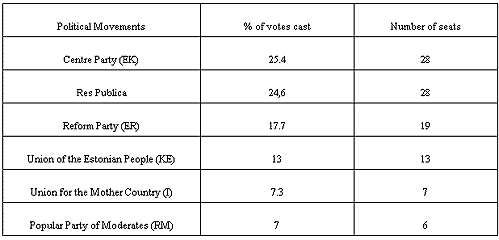News
Corinne Deloy,
Fondation Robert Schuman,
Helen Levy
-

Available versions :
EN

Corinne Deloy
Fondation Robert Schuman
Helen Levy
The Assembly for the Republic - Res Publica caused a surprise during the Estonian general elections by winning 24.6% of the vote and taking second place by less than 1% (0,8%) behind the Centre Party (EK) that won 25.4% of the vote. Each of the two parties won 28 of the 100 seats in the Riigikogu (the mono-cameral Estonian Parliament). Res Publica, that was credited with only 14% of the vote in the last opinion polls, was created just a year ago and has, after these general elections, become one of the main political movements in Estonia. However the Centre Party that is led by the former Home Secretary Edgar Savisaar, who the opinion polls granted 31% of the intention to vote, has achieved a below average performance without succeeding in clearly coming through as the inevitable movement of the country's future government.
Res Publica has therefore confirmed the success it achieved in the last local elections in October 2002 when the party came out second in terms of numbers of seats won across the whole country. The movement led a campaign under the slogan "Choose order", against corruption, in favour of security and the respect of law and order. Although Res Publica says that it is in favour of Estonia joining the EU and NATO its programme on these subjects as in many other areas is deemed vague by many of its opponents.
Behind the two parties that won came the present Prime Minister, Siim Kallas' Reform Party (RE) that won 17.7% of the vote, i.e. slightly less than the opinion polls had forecast, and nineteen seats. It was followed by the Union of Estonian People (KE), that won 13% of the vote and thirteen seats; the Union for the Mother Country (I) with 7.3% of the vote and seven seats and the Popular Party of Moderates (RM) that won 7% of the vote and six seats. We should point out that the participation rate that is traditionally low in Estonia was slightly higher than the one recorded during the last general elections on 7th March 1999: 58%, i.e. 0.6 points more.
Since none of the six movements won a majority in the Riigikogu the next government will be a coalition. As soon as the results were announced, Juhan Parts, former President of the Revenue Court and the new president of Res Publica declared that his party intended to lead the future government and excluded any coalition with the Centre Party. Juhan Parts announced that his party is ready to negotiate with the other movements represented in the Riigikogu. For his part the President of the Republic Arnold Rüütel whose task it is to appoint the Prime Minister has intimated that he would not necessarily appoint the leader of the party that won the elections to form a solid government coalition. "I shall speak to the leaders of the all the parties elected to Parliament in order to find a means of forming a government that will work" he stated.
After the success of Einars Repse's New Era in the Latvian general elections on 5th October and then the surprise victory by Rolandas Paskas in the presidential election in Lithuania on 5th January 2003, Res Publica's results in Estonia bear witness to the rise to power of newly formed political parties in the Baltic Countries; they have managed to persuade the electorate that they represent real change by voluntarily developing populist themes whilst rallying to their cause a part of the population who feel they have been neglected in the transfer over to the market economy and who are scared by the changes that taken place over the last few years and also the future.
Results of the general elections on 2nd March 2003:
Participation : 58%
 Source Agence France Presse
Source Agence France PresseOn the same theme
To go further
Elections in Europe
Corinne Deloy
—
15 April 2025
Elections in Europe
Corinne Deloy
—
25 February 2025
Elections in Europe
Corinne Deloy
—
18 February 2025
Elections in Europe
Corinne Deloy
—
28 January 2025

The Letter
Schuman
European news of the week
Unique in its genre, with its 200,000 subscribers and its editions in 6 languages (French, English, German, Spanish, Polish and Ukrainian), it has brought to you, for 15 years, a summary of European news, more needed now than ever
Versions :



